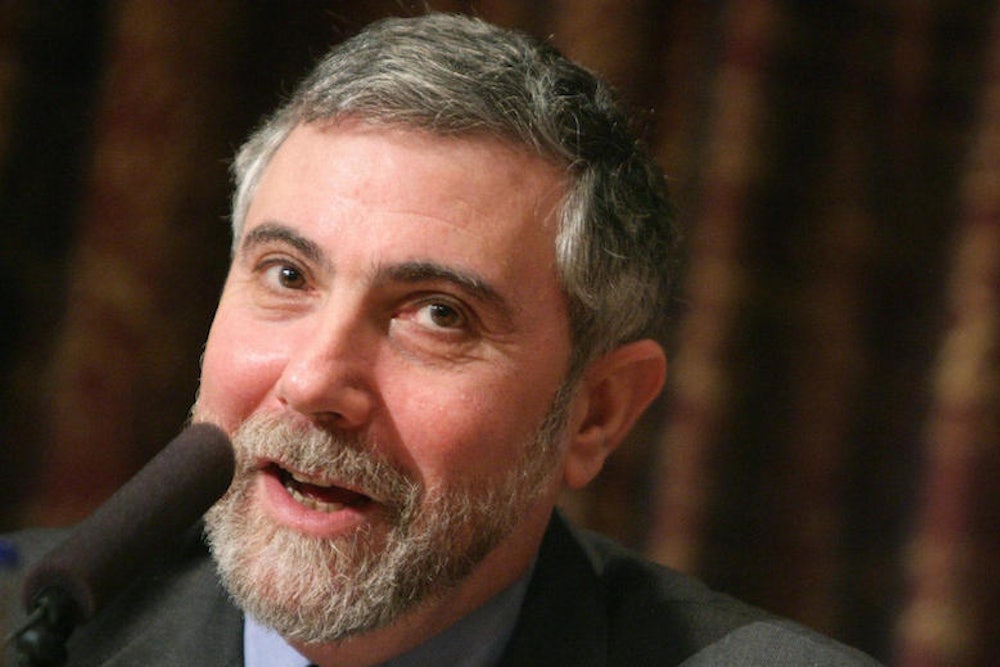New York Times op-ed columnist and Princeton economics professor Paul Krugman will receive $250,000 in his first year teaching at the City University of New York, according to documents obtained by Gawker’s J.K. Trotter. According to the formal offer letter, Krugman’s prime job won’t be teaching. Instead it will be, in Trotter’s and CUNY’s words, “to ‘play a modest role in our public events’ and ‘contribute to the build-up’ of a new ‘inequality initiative.’”
You get it, right? Liberal goes to work on inequality … by taking a big salary! What a fraud! Hypocrite lecturer!
“Irony is dead,” reports Mediate’s Noah C. Rothman, displaying a Morissette-ian acuity for the concept. “How’s that for income inequality?” asks The Washington Examiner’s Ashe Schow. HotAir and The Blaze contributed posts of similar sentiments. TownHall political editor Guy Benson tweeted: “Paul Krugman, in January: ‘The Myth of the Deserving Rich’ … #Fun.”
But the notion that only poor people have standing to bemoan inequality is symptomatic of the kind of class warfare that the right claims to fear. It’s also just kind of stupid. One guy who is trying to mildly alter a system from within should not be barred from living within the currently existing system, which in Krugman’s case means charging what the market will bear for the service he provides. Krugman favors raising taxes on the richest—does that make him a hypocrite for paying his taxes at existing rates rather than giving more money to the government? As for what this means for people who agree with Krugman, people on all sides of all debates should want the smartest people representing their sides, and in our society, the smartest people, particularly in academic fields, tend to be paid the most. After all, we are not communists.
Getting paid what one can, as Krugman is doing, does not go against what Krugman believes. In the post Benson links to, Krugman condemns the sociological conceit that states the richest must be the most deserving, or else they wouldn’t be the richest. Conservatives, he contends, are the ones who feel that way. He doesn’t, which is probably why, in one of the emails Gawker obtained, Krugman bashfully describes the offer as “remarkably generous.”
And it’s not all that generous! $250,000 is almost certainly a pay cut (without even adjusting for the massive cost-of-living increase involved in living walking-distance from Zabar’s): An average Princeton full professor makes $181,000, and Krugman, as a decidedly above-average Princeton full professor—he won a John Bates Clark Medal and also some Swedish award—likely made much more. Economist Joseph Stiglitz, who is similarly accomplished (and probably more left-wing), got a $300,000 salary from Columbia in 2001.
One suggestion is that the rules are different because CUNY is a public university. But CUNY aims to compete with the top universities, public and private. As one of its taxpayer-funders, I am glad to see it spending its money on a professor who is in a unique position to both draw attention to CUNY’s work on income inequality and to actually do that work. (The problem with offering retired General David Petraeus $150,000 was not the sum itself, but that Petraeus was plainly not worth half that.)
Finally, if one looks to the column from this past January in which Krugman coined the phrase “the deserving rich,” one finds that Krugman’s prime point is that the sociological, capitalism-and-the-Protestant-ethic narrative promulgated by the right “misidentifies the winners from growing inequality.” As he explains:
White-collar professionals, even if married to each other, are only doing O.K. The big winners are a much smaller group. The Occupy movement popularized the concept of the ‘1 percent,’ which is a good shorthand for the rising elite, but if anything includes too many people: most of the gains of the top 1 percent have in fact gone to an even tinier elite, the top 0.1 percent. And who are these lucky few? Mainly they’re executives of some kind, especially, although not only, in finance.
By contrast, Krugman’s CUNY salary, by itself, would not put him even near the one percent nationally, much less in the country’s most unequal and finance-heavy city.
The right goes after a mild-mannered liberal polemicist and economist as a fat cat. If they’re so concerned about hypocrisy, they should get over themselves. If they’re so concerned, suddenly, about inequality, then they should be welcomed with open arms, and be amicably advised to avert their gazes from CUNY and instead train them 80 blocks downtown.
